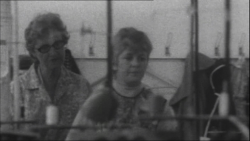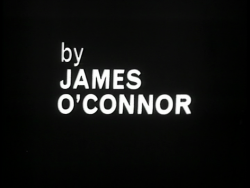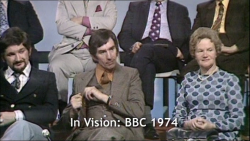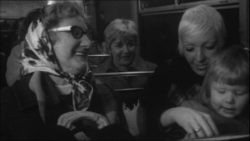DAVID ROLINSON
Play for Today Writer: Colin Welland; Producer: Kenith Trodd; Director: Roy Battersby
This essay continues from Part 1.
The play

Early in Leeds United!, Annie (Teresa Anne Keegan, played by Josie Lane) walks along early morning streets, picking up a friend and arriving at the bus stop on her journey to work. An ambitious crane shot accompanies her walk, leaves her in order to reverse across a street and rises above outhouses to find her further on. As she walks, we hear a male voice-over set out her new contract, the terms of which have reduced her rights. This sequence “set the tone”, according to Clive James:
ably combining the humanist touch with the analytical glance. […] their company contracts were read out in plummy tones on voice-over. ‘The company has no contractual pension arrangements covering your employment.’ Which meant that you work for half a century and they scrap you.1
This practice was so common that Welland heard about another example just a few weeks before the play was broadcast: “a 61-year-old seamstress who works in the same clothing factory as Colin Welland’s mother-in-law in Leeds was made redundant. She had worked in the same place for 25 years but because she was over retiring age she was not entitled to any redundancy pay.” Welland’s response: “Bastards, they are”.2
Continue reading “Women and Work: Leeds United! (1974) Part 2 of 3″ →
 James O’Connor – often known as Jimmy O’Connor – wrote a number of popular and successful television plays in the 1960s and early ‘70s, regularly collaborating with director Ken Loach. He had an unusual background for a television dramatist. He was formerly a career criminal who had turned to writing while serving a life sentence for murder, having narrowly avoided being hanged.
James O’Connor – often known as Jimmy O’Connor – wrote a number of popular and successful television plays in the 1960s and early ‘70s, regularly collaborating with director Ken Loach. He had an unusual background for a television dramatist. He was formerly a career criminal who had turned to writing while serving a life sentence for murder, having narrowly avoided being hanged. 


